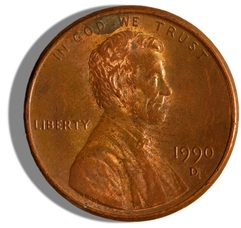|
My son picks up a penny off the parking lot. “Dad! A penny!!!” He handed it to me and I quickly discarded it, flipping it back to the blacktop. Pennies are a nuisance. There is even talk that U.S. Treasury might discontinue them. It actually costs1.8 cents to produce a penny, almost twice as much as its face value. In 2013, taxpayers lost $105 million on the making of pennies and nickels. My son picked the penny up again. “Can you even believe this is on the ground?! Should we look for the owner? Maybe they’re missing it. If we can’t find them, can I keep it?!” I saw the penny as insignificant. He saw it as a treasure. The Bible consistently lifts up three types of people who are the most insignificant in society . These three are treated like a penny on the ground, never to be picked up. They are “the foreigner, the fatherless, and the widow.” Here is a brief catalog of their priority in Scripture:
“Do not oppress the widow, the fatherless, the foreigner, or the poor . . .” (Zech. 7:10). “You shall not wrong a foreigner . . . you shall not mistreat any widow or fatherless child” (Ex. 22:21). “He executes justice for the fatherless and widow and loves the foreigner” (Deut. 10:18). “The Lord watches over the foreigner, he upholds the widow and the fatherless” (Ps. 146:9). “They do not bring justice to the fatherless, and the widow’s cause does not come to them” (Is. 1:23). “Do not oppress the foreigner, the fatherless, or the widow” (Jer. 7:6). “. . . those who oppress the widow, the fatherless, and those who thrust aside the foreigner” (Mal. 3:5). Why are these three so insignificant? The foreigner is a stranger in a land that is not his home. He has no rights and no land. He’s not a citizen, and a second-class person. The fatherless child is an orphan with no home. He or she is a weak and defenseless member of society. Widows in biblical times had a similar standing - no protection or security. In short, they all three share this in common. They have no voice and no power. For the OT prophets, the “foreigner, the fatherless, and the widow” was a recurring refrain. How Israel as a society treated its insignificant was a test case for how they were living out the covenant. And when they discarded the insignificant, they witnessed the vicious side of Yahweh. He is the Defender of the defenseless. If you mess with the insignificant, you’re messing with God. These insignificant remain today. There are foreigners - immigrants and refugees. There are orphans and foster children, or children abused and neglected. There are widows all alone with no one to care. We could add to the list. The disabled and handicapped. The aged and dying. The unborn. The lonely and forgotten. The socially awkward. God values the insignificant. What we would dismiss, he treasures and prizes. As his people, we must value what he values. How might we also value the insignificant, as he does? Three words to help us. Identify: Who are the insignificant people around you? Before you can value the insignificant, you must know who they are. You must have awareness - eyes that are open to those who are often invisible to society. Assess: What do they need? Not “what do I think they need.” Not demanding my desired outcome. What does God want for them and what’s best for them? Act: What will I do? What do I have that they lack? For the voiceless, we can give a voice. For the powerless, we can give strength. For the lonely, we can give time. We are not saviors or messiahs, but we know the Savior. And we have been given things by Him that may bless others. God values the insignificant. Be ready to pick up someone insignificant today.
Grandma Jo
1/27/2015 10:59:10 am
Thank you I needed to hear how blessed I am today and everyday to be able to act in what God wants me to do for others.
Jeff Cloeter
1/29/2015 04:24:37 am
You are incredibly blessed! Comments are closed.
|
JOIN My Tribe
|



